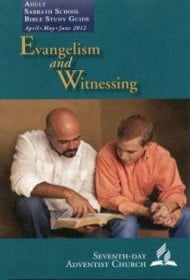Evangelism and Witnessing Introduction
 Although experts disagree on the exact number, one thing is certain: many Protestant denominations exist today. Hundreds, even thousands.
Although experts disagree on the exact number, one thing is certain: many Protestant denominations exist today. Hundreds, even thousands.
Which leads to such questions as, Why the Seventh-day Adventist Church? What’s our purpose? What relevance do we have?
The answer is simple: God raised up this church to proclaim “present truth,” the Three Angels’ Messages of Revelation 14:6–12.
Yes, a number of churches exist and many with aggressive outreach and evangelism programs too. But, at last count, there’s only one church specifically proclaiming the Three Angels’ Messages ofRevelation 14. That church is ours–and that’s why we’re here. Period.
Thus, whatever else our church is doing, first and foremost, we should purposefully attempt to lead as many people as we can into God’s eternal kingdom. Whether we call it “spreading the gospel,” “evangelizing the world,” or preaching “present truth,” our core business is to tell the Jesus story with the intention that people will accept Him as Lord and Savior and become disciples and even disciple makers.
Although most local churches are involved in many activities, and (ideally) all of those activities are good and useful—our challenge must be to make all that we do as a church relate to the core business of reaching the lost with the “everlasting gospel” (Rev. 14:6) and all that it entails.
Of course, even with the benefits of modern technology the task is huge. And when all is said and done, the task falls upon millions of volunteers motivated by a love for God and for lost humanity—a love for those whose sins Jesus bore on the cross just as much as He bore ours.
While evangelism and witnessing is the personal responsibility of each believer, the whole body of Seventh-day Adventist believers (the church) has a corporate responsibility, as well. As each member contributes to the evangelistic goals and strategies of his or her local church, precious people are won to Christ. And here’s a point that can’t be overemphasized: if it’s not done at the local church level, it just won’t get done.
In the context of outreach, understanding spiritual gifts also is important. It is vital, however, to not only encourage members to discover how they are spiritually gifted, but to also present them with opportunities to exercise those gifts. Fundamental belief number 16 says in part: “God bestows upon all members of His church in every age spiritual gifts, which each member is to employ in loving ministry for the common good of the church and of humanity. Given by the agency of the Holy Spirit, who apportions to each member as He wills, the gifts provide all abilities and ministries needed by the church to fulfill its divinely ordained functions.”—Seventh-day Adventists Believe . . . (Hagerstown, Md.: Review and Herald® Publishing Association, 1988), p. 206.
An understanding of the gospel story coupled with a personal connection to Jesus Christ will enable people to work with the right motivation for saving souls. Evangelism and witnessing should be motivated by a love response, not by fear or guilt.
As with any study, this quarter’s lessons will help to increase a person’s store of biblical knowledge. That’s fine, but the goal is not just to gain knowledge, no matter how wonderful the knowledge. The goal is for us to use that knowledge for good, and in this context the greatest good is to give those who face eternal destruction the opportunity for eternal life.
That’s the reason for the Seventh-day Adventist Church. What better one could there be?
Joe A. Webb is pastor of Nambour and Yandina churches in the South Queensland Conference, Australia.
Editorial Office: 12501 Old Columbia Pike, Silver Spring, MD 20904.
|
Principal Contributors: |
Editorial Assistant: |
Copyright © 2012 by the Office of the Adult Bible Study Guide, General Conference of Seventh-day Adventist. All Rights Reserved.

Some new believers and members, as well, in the church have not found their spiritual gifts. In my past experience, many lives were changed by pastors offering workshops on studies of spiritual gifts. People began to understand the Word of God personally. Then examined themselves to see, what their strenghts and weakness where. This opened their eyes to see how the Word applied to their lives. It encouraged their gift or gifts to grow, while being used by the Holy Spirit, in evangelism and development of the church, ministry, and community of God.
It is very important, that we pray for the outpouring of the HOLY SPIRIT in our Church today.